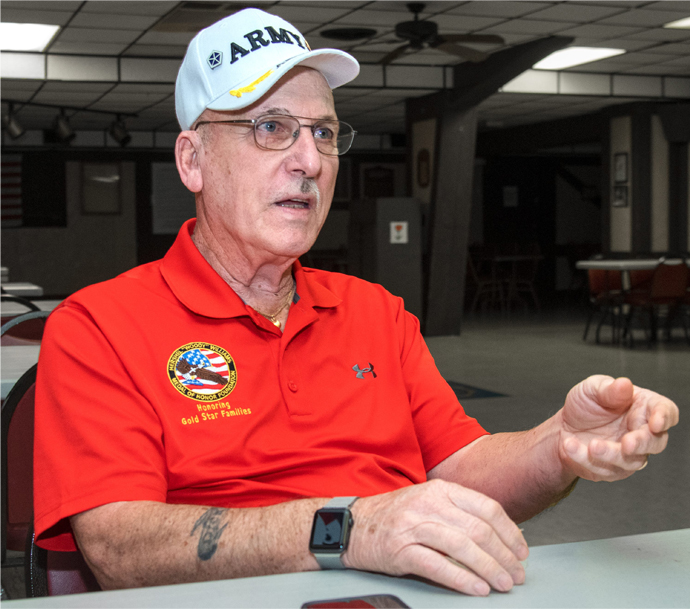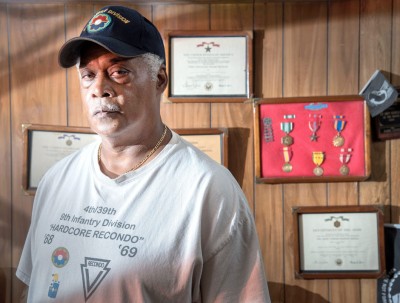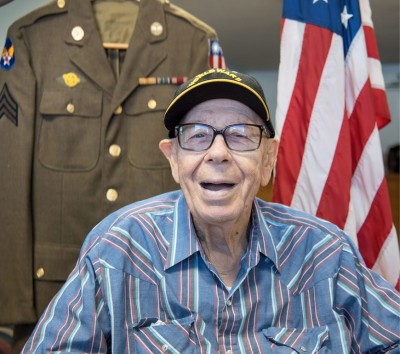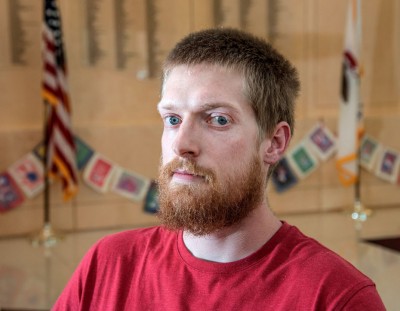Richard Revell
By Paul Wood

Photo By Robin Scholz/The News-Gazette
Robin Scholz/The News-Gazette Richard Revell served from 1961-1963 in Bad Hersfeld Germany and was there when the Berlin Wall went up. He had a mission to be in direct support of the 14th Cavalry and our 3rd platoon had a Atomic Demolition Mission and were ready to detonate it if there was aggression from the East.At the Champaign American Legion on Friday, Sept. 6, 2019.
CHAMPAIGN — In 1955, Richard Revell saw a war movie called “To Hell and Back.”
It starred war hero Audie Murphy as himself, telling the story of his service in World War II.
Revell was 11.
“Right then, I knew I wanted to serve in the Army,” he said.
Revell, now 75, remembers playing war — dressed half like a cowboy and half a soldier.
He dropped out of Champaign Central to enlist in the Army.
A friend tried to talk him into joining the Marines, but Revell was determined to follow in Murphy’s footsteps.
He served in Germany in the early 1960s with combat engineers, about three miles from the border where East Germans and Russians were on the ready to cross the bridges.
Company D 317th Engineers was posted to “slow down the Russians just in case,” by blowing up those bridges.
It was the summer of 1961.
“It turned out I was one lucky guy, having been assigned to a unit in Europe, as my brother was in Germany at that time,” Revell said.
“In February, I took a trip down to Oberschleissheim Air Base, just north of Munich, to visit him for three days and show him how good I was at throwing up everything I drank.”
But it was quite a serious time.
In Bad Hersfeld, a spa city, his unit was in support of the 3rd Squadron of the 14th Armored Cavalry. Its mission was to patrol the border of Germany.
They carried atomic demolition munitions, aka portable nuclear weapons. But the invasion never happened and the bombs were never used in combat.
In August 1961, the East Germans built a barbed wire and concrete wall, an “antifascist bulwark,” between East and West Berlin. Revell was there to see it.
“It was a very tense time,” he said.
As those tensions lessened, his unit had extensive training all over the border.
They bridged the Rhine River three times in his 30 months, including using pontoon bridges and pre-fabricated Bailey Bridges first used by the British in World War II.
In quieter months, Revell spent much of his time driving for 1st Sgt. Sidney D. Nash, who had to turn in reports every day to battalion headquarters. Nash encouraged him to get his GED, and Revell eventually followed that advice.
Overall, Revell said he enjoyed being in Germany.
“Drinking beer and dancing with Frauleins” was a happy duty compared to serving in the early years of the Vietnam War.
“Looking back, they were some of the best years of my life and some life-long friendships,” he said.
A highlight of his tour was representing his company in Hanau, Germany, when President John F. Kennedy flew in from Berlin.
Another great time “was taking candy and presents to the kids in the zone that was off-limits because of the border.”
Sadly, the president was assassinated on Nov. 22, 1963. Revell was at a regimental boxing tournament when he heard the news.
As dangerous as his posting was, it was safer than fighting in Vietnam, he recalled.
Revell still mourns for the 58,000 U.S. soldiers killed in the Vietnam War.
After his service, he became a veterans advocate and a member of Champaign American Legion Post 24.
Friends George W. Collina, Ronald J. Long and Richard Nutt gave their lives in Vietnam, and their sacrifice is noted on the Vietnam Veterans Memorial Wall.
Revell and wife Penny traveled to Baton Rouge, La., for the dedication of its Gold Star Families Memorial. He also met with the governor of Delaware and its legislators and spoke about the program.
Revell advocates making a donation to the Hershel W. Williams Medal of Honor Foundation at hwwmohf.org. He is an honorary board member.
Revell does woodwork that he sells, including cremation urns; 100 percent of the proceeds go to the foundation. He hopes Illinois will get its first Gold Star Memorial, in Springfield.
After a career as a union electrician, Revell has a home in Florida and spends as much time as he can in Champaign, enjoying his family and organizing for the foundation.
Read more stories from local veterans:
 Robin Counce
CHAMPAIGN — Robin Counce, who carried a grenade launcher in Vietnam, was nearly killed by “friendly fire” and still sees …
Robin Counce
CHAMPAIGN — Robin Counce, who carried a grenade launcher in Vietnam, was nearly killed by “friendly fire” and still sees …
 Robert Weaver
Between bouts learning at and then teaching at Chanute Field in Rantoul, Robert Weaver served in World War II in North A …
Robert Weaver
Between bouts learning at and then teaching at Chanute Field in Rantoul, Robert Weaver served in World War II in North A …
 Brent Blackwell
URBANA — In five deployments to Afghanistan, Staff Sgt. Brent Blackwell was a medic for an elite unit, the Army Rangers, …
Brent Blackwell
URBANA — In five deployments to Afghanistan, Staff Sgt. Brent Blackwell was a medic for an elite unit, the Army Rangers, …